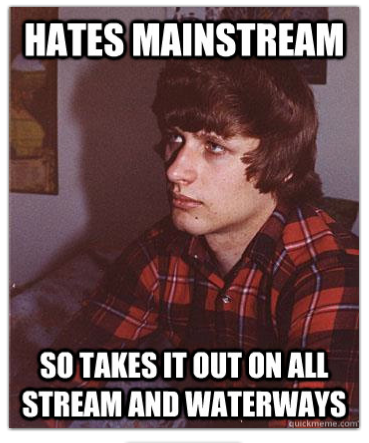If you are a regular user of social media you have, perhaps, stumbled across Hipster Harper, a new series of memes making the rounds on Twitter and Facebook. Now, Hipster Harper, with its photo of a young Stephen Harper in plaid shirt and shaggy hair, is amusing enough. It doesn’t exactly make a deep political statement, and as far as Internet humour goes, it’s pale compared to Hipster Hitler, at least thematically. But above all else, it’s a troubling reminder of what it now means to be Canadian.
See, whether I fit squarely into the ‘hipster’ category or not, I do have several photos of myself that are almost identical to the one used by Hipster Harper. I’ve worn that shirt.
Between the ages of 15 and 21 I had that hairdo (in fact, Harper may have worn it better — I had more of a wiry, Eric Clapton-grade Afro thing going on). And I’m rather uncomfortable with the thought that Harper and I might identify with the same group.

It’s not just Hipster Harper. I share many a superficial similarity with our PM, from his passion for the Toronto Maple Leafs, to his love of animals, to his knowledge of the Beatles’ catalogue. Of course, I’m supposed to identify with these character traits. They have been manufactured, or at the very least played up, by the Tories’ PR machine with the express purpose of making Harper seem relatable.
Not that his relatability necessarily translates to votes. Contrarily, I’m a little embarrassed to find we share anything, let alone hobbies or interests. And this is how Hispter Harper makes me worry about my own Canadianness.
In the same vein as my feelings about our shared love of plaid, but on a much greater scale, I’m becoming increasingly uneasy with the idea that Harper represents a country and nation with which I identify. In fact it’s worse, because Harper has more control over Canada than anyone could ever have over hipsterdom.
I am very happy to be from Canada. And, in the past, I was generally proud of what Canada stood for. Canada was never perfect, and certainly there has never been a politician with whom I’ve identified 100 per cent. But since Harper took power, and particularly since his government snatched a majority, Canada has become a different country: Harper’s Canada. And I’ve identified less and less with the path Canada’s leadership, and by extension Canada itself, has taken.
I would never disavow my country, but when I hear that ‘Canada’ is not joining Kyoto, ‘Canada’ wants to make deals to handover oil sands rights to China, ‘Canada’ has eliminated its International Development Agency, it’s very clear that I am not a part of the Canada being talked about.
Granted, that’s par for the course in a democracy. And, obviously, when a majority government is in place, it makes me part of the minority to say that the government does not represent my wants and needs. But Harper’s Canada is especially hard to be proud of: the heightened regulations on immigration, the diminished importance of environmentalism, the increased value placed on the military, the abandonment of foreign aid.
The decisions made by the government are, by way of changing what Canada stands for, changing what it means to identify as a Canadian.
I’m not ready to throw the baby out with the bath water. I’ll always like the Leafs, for instance, even if Harper drapes himself in blue and drops the ceremonial faceoff puck. And I’ll never want to be anything other than a Canadian. But that doesn’t mean that ‘Canada,’ the Conservative iteration of it at least, represents me. As long as this country is that ‘Canada,’ I’m Canadian with an asterisk.
Peter Goffin is a writer and recent political science graduate living in Toronto. His work has appeared in The Toronto Star, OpenFile, and This magazine.



